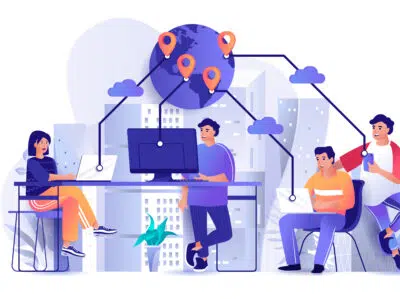5 Effective ways of fostering a culture of belonging in the hybrid workplace

How Inclusive Is India Inc.?
August 8, 2023
Data-driven talent acquisition is the new mantra
August 10, 2023
As we have seen in the last year or two, a hybrid workplace is the crux of the new-normal landscape. Changing employee priorities were a significant factor that led to the evolution of the hybrid workplace. Most people realised there were options to work remotely, with scope for better work-life balance. Many preferred to change jobs rather than return to a fully offline workplace. The writing on the wall was clear - Hybrid is here to stay. So, organisations had to focus on making it work.
Organisational success depends on motivated employees working towards a common goal, made possible only through a culture of belonging. This culture included dressing appropriately, little moments of bonding and care, celebrations, shared lunches, etc. The hybrid workplace threw some challenges in bringing this about. How can effective communication, team spirit, or trust evolve among members when they are not physically together?
But the culture of belonging is crucial as it unites people, gives them a sense of purpose, and inspires them to give their best daily. Many Gen Z employees who joined remotely did not experience traditional workplaces or view the culture of belonging as we know it. Hence, their understanding differs. Multiple studies indicate they place a lot of significance on a company culture built on mental health and wellness. Also, their outlook includes tangible outcomes for their careers apart from non-discriminatory workplaces that encourage equal growth opportunities.
So, how can organisations foster a culture of belonging in a hybrid workplace with all these factors at play? Here are five ways:
- Ensure adequate remote working tools and support
Organisations must leverage technology to create a culture of belonging. Ensure communication and collaboration tools that support efficient remote work and aid team spirit. Conduct remote training and encourage people to reach out to each other for knowledge-sharing and mentoring, just as in an office environment. Facilitate remote hangouts and fun activities and ensure that people maintain a personal touch in the hybrid mode.
- Invest in some team-building activities
In the hybrid mode, people may come to the office occasionally. Plan in-office days based on when the maximum number of people can be present. Use these opportunities to run team-building programs to create a sense of belonging among team members. You can also plan periodic outings such as lunches, dinners, movie outings, or even a weekend trip where people can relax, interact, and forge friendships.

- Create equitable work policies
A significant step towards hybrid workplace success is to change HR policies to reflect the hybrid culture. The policy updates ensure managers or HR do not overlook remote/hybrid workers for training, promotions, etc. Ensure transparency and accountability for all roles to avoid such issues. Create Employee Support Groups (ESGs) to resolve employee grievances, communication gaps, and misunderstandings that crop up.
A recent Gartner research found a lack of DEI initiatives as one of the main reasons employees feel like outsiders. Conversely, organisations with sustainable DEI initiatives demonstrated a 20% increase in inclusion. A McKinsey article about hybrid as the future of work said 58% executives quoted improved productivity. The report also quoted 40% of productivity leaders having entirely reimagined their hiring processes.
- Be courageous enough to allow a new culture of belonging to develop
Most Gen Z employees got hired remotely and do not have any exposure to a typical office work culture. They have ‘shown up for work' in their Tees in virtual rooms, and their primary interaction with colleagues has been digital. Can companies allow them to become influencers of a new culture? It helps if organisations listen more as Gen Z shares their perspectives on the culture of belonging. They believe work is something to do, not a place they go to! Therefore, it is essential to delink culture from a physical office and make it about people. Forge a new culture by removing legacy beliefs that aren’t truly inclusive.
- Schedule a daily sync
One way to avoid communication breakdowns or misunderstandings in hybrid work is to schedule a daily sync with the teams. This approach is essential in geographically distributed teams. Establish core hours in such scenarios wherein all members are available for at least a few hours. A daily ten-minute sync-up can foster a sense of togetherness since people understand and appreciate how everyone works towards a common goal.
The hybrid workplace can throw up a few challenges towards fostering a culture of belonging. However, a few carefully considered strategies can help organisations overcome these challenges and reap its benefits.
References:


